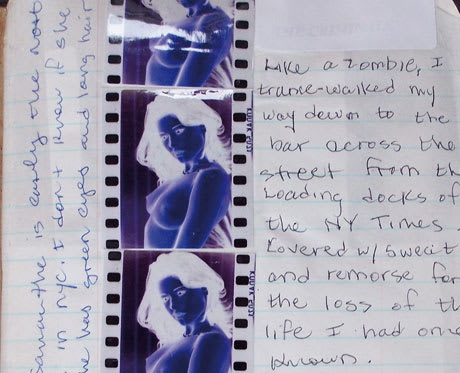Before its Disney-fied makeover in the '90s, Times Square was once the seediest section of New York City. And anyone who visits Times Square today can see for themselves what has happened to the notorious landmark, but what of the people?
Dutch director Klaas Bense stumbled across a diary on eBay — being sold but not by its author — that detailed a life as a desk clerk at the Times Square Hotel, which at the time was a flophouse for transients and the down-and-out. It's full of names and photos, providing Bense with enough clues that may or may not lead him to the diary's writer. The mystery itself is besides the point, as is a potential sociological subplot about gentrification that Bense avoids entirely.
Instead, his film is about the people who moved on and the people who stayed behind. Both camps recite a litany of life's disappointments yet display resilience and the ability to rise above circumstance. One former prostitute becomes a sex educator; a photojournalist goes from being glued to a police scanner to becoming a Lebanese war correspondent; and one of Barack Obama's Columbia classmates comes to accept his role in life as a bartender/philosopher.
After a while, Times Square becomes a mere backdrop, a stand-in for any neighbourhood with broken dreams and battered lives. "You remember more than I've forgotten," one character tells the director. There is no romance to the tales of long-ago squalor, no longing for a time when everything wasn't scrubbed clean on a daily basis, nor is there apologies. There is only the past and whether we choose to let that dictate our present and future.
Dutch director Klaas Bense stumbled across a diary on eBay — being sold but not by its author — that detailed a life as a desk clerk at the Times Square Hotel, which at the time was a flophouse for transients and the down-and-out. It's full of names and photos, providing Bense with enough clues that may or may not lead him to the diary's writer. The mystery itself is besides the point, as is a potential sociological subplot about gentrification that Bense avoids entirely.
Instead, his film is about the people who moved on and the people who stayed behind. Both camps recite a litany of life's disappointments yet display resilience and the ability to rise above circumstance. One former prostitute becomes a sex educator; a photojournalist goes from being glued to a police scanner to becoming a Lebanese war correspondent; and one of Barack Obama's Columbia classmates comes to accept his role in life as a bartender/philosopher.
After a while, Times Square becomes a mere backdrop, a stand-in for any neighbourhood with broken dreams and battered lives. "You remember more than I've forgotten," one character tells the director. There is no romance to the tales of long-ago squalor, no longing for a time when everything wasn't scrubbed clean on a daily basis, nor is there apologies. There is only the past and whether we choose to let that dictate our present and future.
